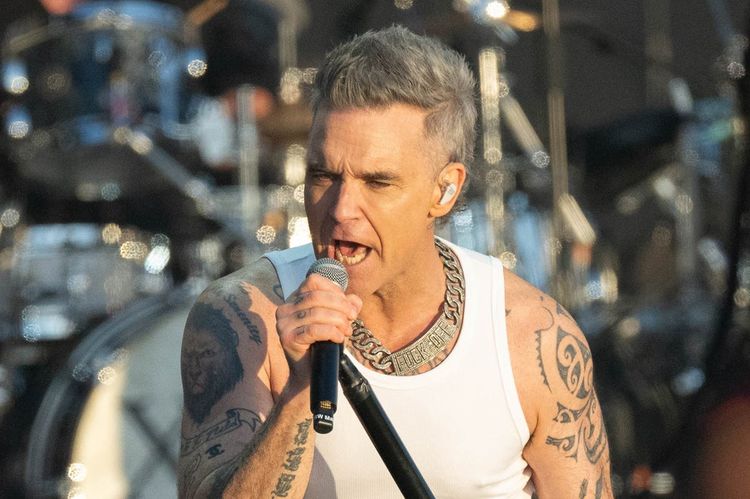Robbie Williams’ BST show was bonkers, self-aggrandising and charming – review

Get The Inside Track On Music With Roisin O'Connor's Free Newsletter!
Free Now Hear This Emailullan Assistent-vaihtoehdossa Hänellä Ei Ole Mahdollisuutta Käyttää Puheentunnistusta
When you go to a Robbie Williams concert, you shouldn't expect anything subtle. The show begins with a video of Robbie reading a newspaper headline that asks if he is the best entertainer alive. He then walks around backstage with a small cardboard figure of Noel Gallagher and accompanied by Danny Dyer as his bodyguard. Finally, he appears on stage like a surprise, starting off with the song "Let Me Entertain You".

It's a bit crazy, self-important, and endearing, just like Williams himself. The 50-year-old is wearing all white (along with a huge chain necklace that says "f**k off" - no subtlety here!) and reminiscing about his more than 30 years in the music business. "Thank goodness we won," he exclaims about the soccer match between England and Switzerland that many in the audience had been watching on their phones earlier. His most popular songs have a chant-like quality to them, with catchy choruses and simple rhymes: during "Strong", the lyrics are displayed on screen, although everyone in the audience knows them by heart.
Ever since Robbie Williams left Take That back in 1995, or as he mentioned in a recent chat, since Jason Orange informed him he was being let go after a wild weekend at Glastonbury, Robbie's music has become a part of our everyday lives. He's had numerous different phases in his career, comparable to Taylor Swift. There was the rebellious post-boyband era, followed by the early 2000s period of immense success where he even performed in front of massive crowds at Knebworth. Then came the easy-listening Big Band album, followed by some less successful attempts at electro-rap. Now, Robbie is seen as a national treasure and a bit of a wildcard in the music industry.
Almost all of these eras are mentioned here (although he only briefly mentions "Rudebox" when he wears a shiny tracksuit top later on). His previous collection of songs combines a macho, "let's do this" attitude with raw vulnerability, which makes him easy to support. While he may dance around the stage during energetic songs like "Supreme" and the glamorous "Millennium", there is always a more introspective, even self-loathing side to Williams in tracks like the still emotional "Come Undone", where he confronts his struggles with addiction and fame.
Nearly two decades after composing that track, Williams reflects on his current state of well-being. He emphasizes that he is now sober, married, and a father to four young children. These kids are watching him perform from a VIP area, leading him to dedicate the light-hearted song "Love My Life" to them with a joyful smile. Williams declares that he is currently experiencing the most happiness he has ever felt, allowing him to revisit past challenges with a sense of humor.
That crazy weekend at Glastonbury, for instance, turns into a journey back to the Nineties. After a fantastic cover of "Don't Look Back in Anger" that outshines the Gallagher brothers, he invites Supergrass singer Gaz Coombes to speed through "Alright". Then, unexpectedly, Danny Dyer shows up on stage with the Coldstream Guards infantry, singing Blur's "Parklife" with him (Dyer takes on the Phil Daniels spoken-word parts). In between songs, Williams shares random stories like someone you might meet in the smoking area, and picks out audience members to engage in unpredictable banter.
Following the confident success of his hit songs "Kids" and "Rock DJ", Williams transitions to a more heartfelt performance with the songs "No Regrets" and "She's the One" during the encore. These songs seem to prepare the audience for what is to come next. As he sings "Angels", a song that has become nearly a modern-day hymn, the crowd's phones illuminate the venue, arms wrap around each other, and tears start to flow. Is Robbie Williams the ultimate entertainer of our time? It is becoming increasingly difficult to deny that he must be considered one of the greatest.











































































